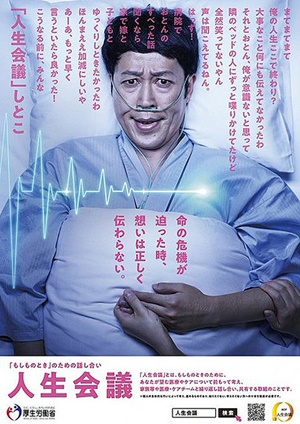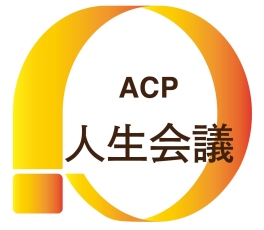人生会議
人生の最終段階でどのような医療を受けるか、事前に本人が家族や医師らと話し合うACPの意識を高める=raise awareness of its Advance Care Planning (ACP)ため、厚生労働省=the Ministry of Health, Labor and Welfareが作成した『人生会議』(愛称)のポスター。
ACP, also known informally as "the life meeting," is a ministry effort that seeks to get people and their families to speak to doctors and others repeatedly about what kind of care they should receive at the end of their life.

吉本興業の小籔千豊さんが、患者に扮してベッドに横たわり眉を寄せ=frown、「俺の人生ここで終わり?」「もっと早く言うといたら良かった!」などの言葉が並ぶポスターは、配慮がない=inconsiderateと反感=backlashを買い、結局、取りやめ=withdrawal/retractionとなりました。
The health ministry’s attempt to use comedy to encourage people to discuss hospice care options with their families in advance fell flat with the public and was criticized as being in poor taste, prompting its withdrawal.
※in advance=事前に
※fall flat=バタンと倒れる、完全に失敗する、〔冗談・ユーモアなどが〕受けない、コケる
※poor taste=悪趣味な.
Japan health ministry withdraws end-of-life-care poster campaign after online backlash (見出し)
Japanese health ministry draws outrage for 'inconsiderate' poster on terminal care (見出し)

ACPや緩和ケア=palliative careを知るきっかけとなるという前向きな投稿もありました。
※palliative=(痛みを)一時的に緩和する 名詞:緩和剤、鎮痛剤 動詞:palliate 病気や苦痛を一時的に和らげる
palliative care はWHOで定められている表現で、言いかえはhospice careやcomfort care などがありました。
寿命が延び、高齢化が進む日本は、高死亡率社会となってきています。
Japanese society has entered a new stage that can be referred to as a “high-mortality society.”
As of 2018, Japanese women had an average life expectancy of 87 years, and men 81 years.
This means that Japanese people’s longevity has increased by at least 30 years since 1947 — just two years after the end of World War II - when life expectancy was 54 for women and 51 for men.
In other words, our society has entered a period in which the number of elderly people prone to die natural deaths is on the increase.
※mortality 死亡率
1950年頃は自宅で亡くなる人が8割でしたが、今は7割が病院と、大きな変化があります。
In Japan, there has been a sea change in the circumstances under which Japanese people pass away.
Around 1950, about eight in 10 Japanese died at home. But the balance began tilting toward hospitals in 1976, and today about seven in 10 Japanese die in hospitals.
※sea change目覚ましい、急激な変化、変貌、社会現状の大変化


